By 2049, Michael T. Klare says China will be a climate disaster zone, not a military superpower.
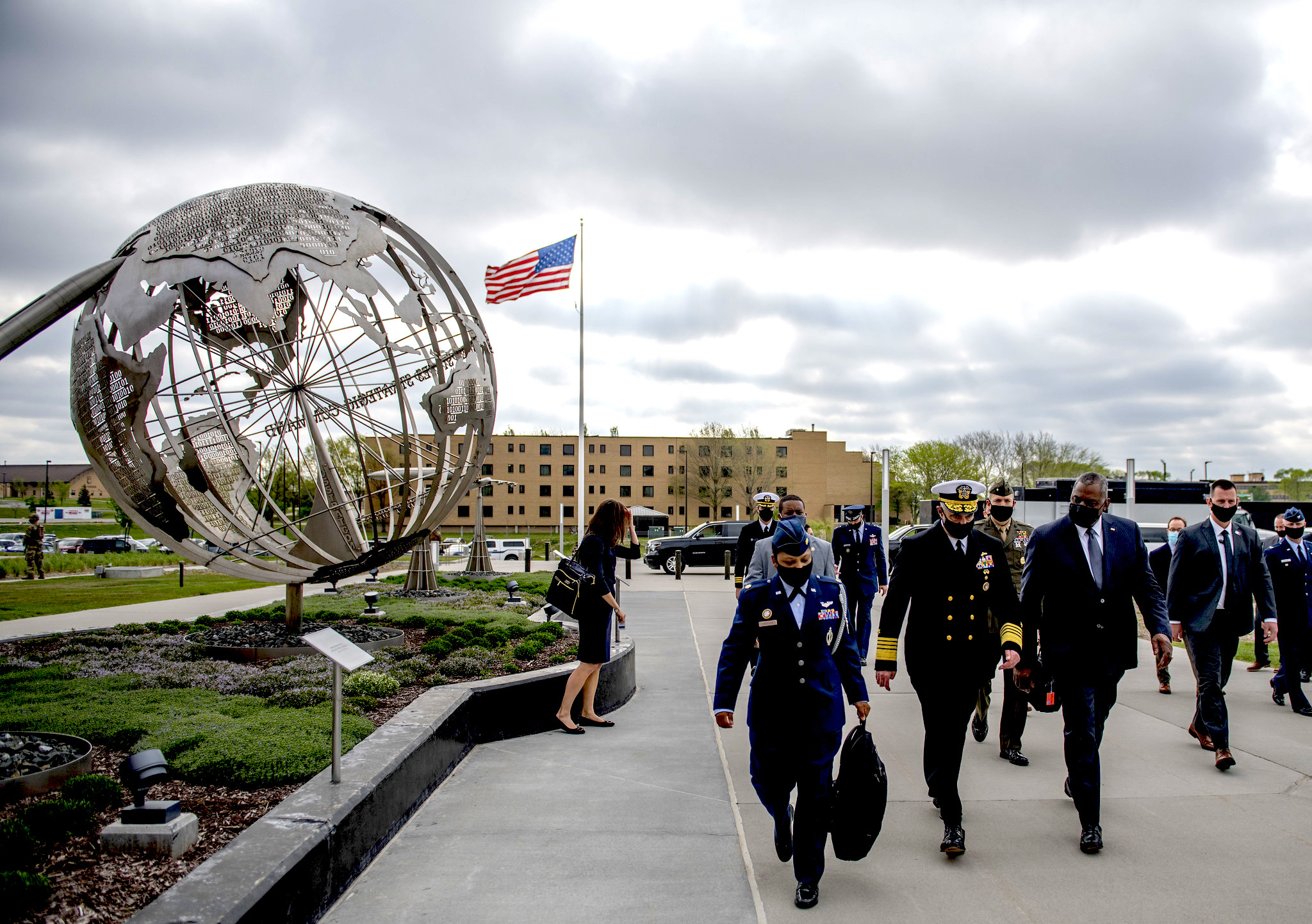
U.S. Secretary of Defense Lloyd Austin, third from left in front row, in May, visiting Offutt Air Force Base, Nebraska. (U.S. Air Force, Brittany A. Chase)
By Michael T. Klare
TomDispatch.com
 In recent months, Washington has had a lot to say about China’s ever-expanding air, naval and missile power. But when Pentagon officials address the topic, they generally speak less about that country’s current capabilities, which remain vastly inferior to those of the U.S., than the world they foresee in the 2030s and 2040s, when Beijing is expected to have acquired far more sophisticated weaponry.
In recent months, Washington has had a lot to say about China’s ever-expanding air, naval and missile power. But when Pentagon officials address the topic, they generally speak less about that country’s current capabilities, which remain vastly inferior to those of the U.S., than the world they foresee in the 2030s and 2040s, when Beijing is expected to have acquired far more sophisticated weaponry.
“China has invested heavily in new technologies, with a stated intent to complete the modernization of its forces by 2035 and to field a ‘world-class military’ by 2049,” Secretary of Defense Lloyd Austin testified in June.
The United States, he assured the Senate Armed Services Committee, continues to possess “the best joint fighting force on Earth.” But only by spending countless additional billions of dollars annually, he added, can this country hope to “outpace” China’s projected advances in the decades to come.
As it happens, however, there’s a significant flaw in such reasoning. In fact, consider this a guarantee: by 2049, the Chinese military (or what’s left of it) will be so busy coping with a burning, flooding, churning world of climate change — threatening the country’s very survival — that it will possess scant capacity, no less the will, to launch a war with the United States or any of its allies.
It’s normal, of course, for American military officials to focus on the standard measures of military power when discussing the supposed Chinese threat, including rising military budgets, bigger navies and the like.
Such figures are then extrapolated years into the future to an imagined moment when, by such customary measures, Beijing might overtake Washington. None of these assessments, however, take into account the impact of climate change on China’s security.
In reality, as global temperatures rise, that country will be ravaged by the severe effects of the never-ending climate emergency and forced to deploy every instrument of government, including the People’s Liberation Army (PLA), to defend the nation against ever more disastrous floods, famines, droughts, wildfires, sandstorms and encroaching oceans.
China will hardly be alone in this. Already, the increasingly severe effects of the climate crisis are forcing governments to commit military and paramilitary forces to firefighting, flood prevention, disaster relief, population resettlement and sometimes the simple maintenance of basic governmental functions.
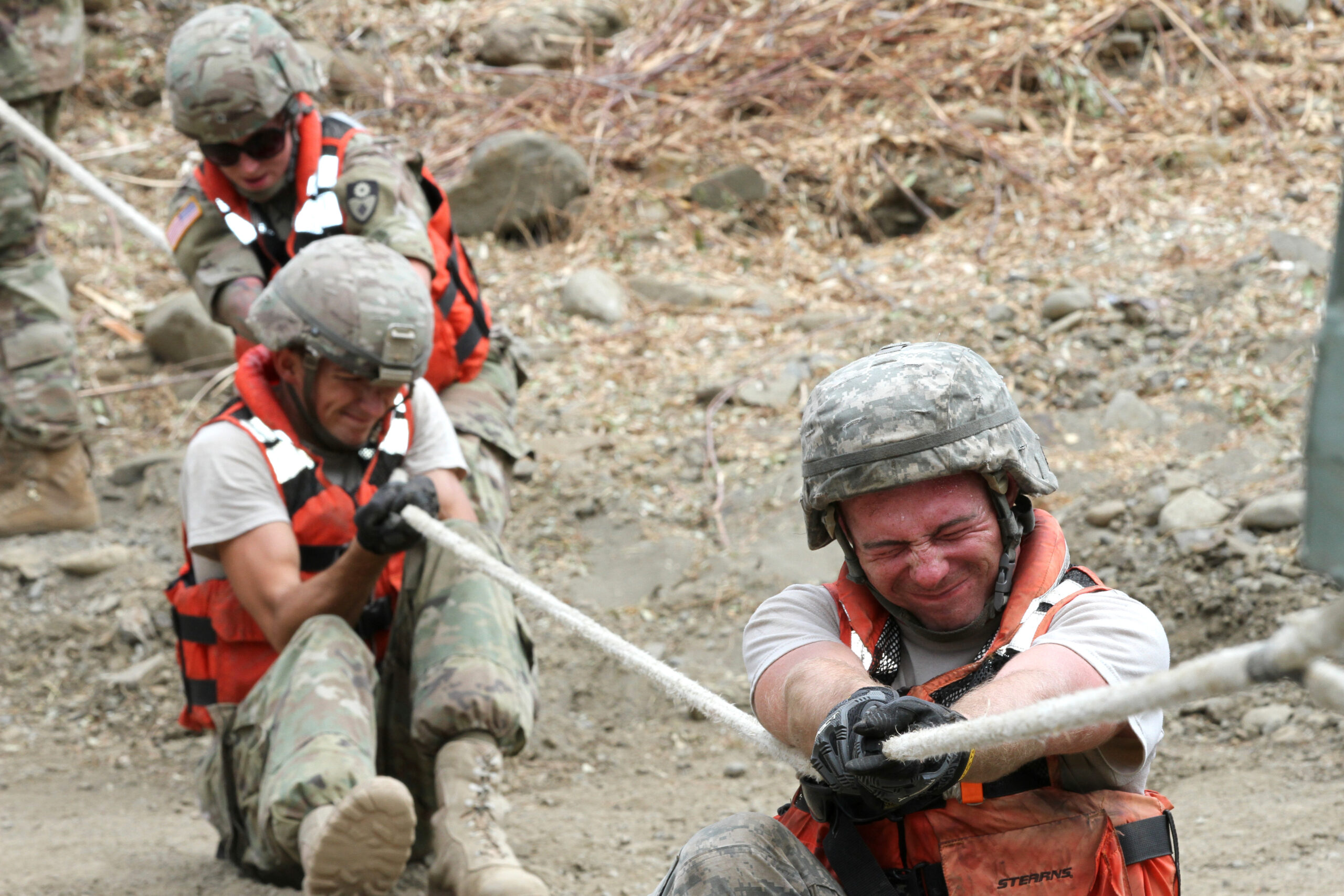
July 13, 2018: Members of the U.S. military working to dismantle a temporary bridge built to help battle a wildfire in Cache Creek Regional Park, Yolo County, California. (U.S. Army National Guard, Eddie Siguenza)
In fact, during this summer of extreme climate events, military forces from numerous countries, including Algeria, Germany, Greece, Russia, Turkey and — yes — the United States, have found themselves engaged in just such activities, as has the PLA.
And count on one thing: that’s just the barest of beginnings. According to a recent report from the UN’s Intergovernmental Panel on Climate Change (IPCC), extreme climate events, occurring with ever more frightening frequency, will prove ever more destructive and devastating to societies around the world, which, in turn, will ensure that military forces just about everywhere will be consigned a growing role in dealing with climate-related disasters.
“If global warming increases,” the report noted, “there will be a higher likelihood that [extreme climate] events with increased intensities, durations and/or spatial extents unprecedented in the observational record will occur.”
In other words, what we’ve been witnessing in the summer of 2021, devastating as it might now seem, will be magnified many times over in the decades to come. And China, a large country with multiple climate vulnerabilities, will clearly require more assistance than most.
The Zhengzhou Precedent
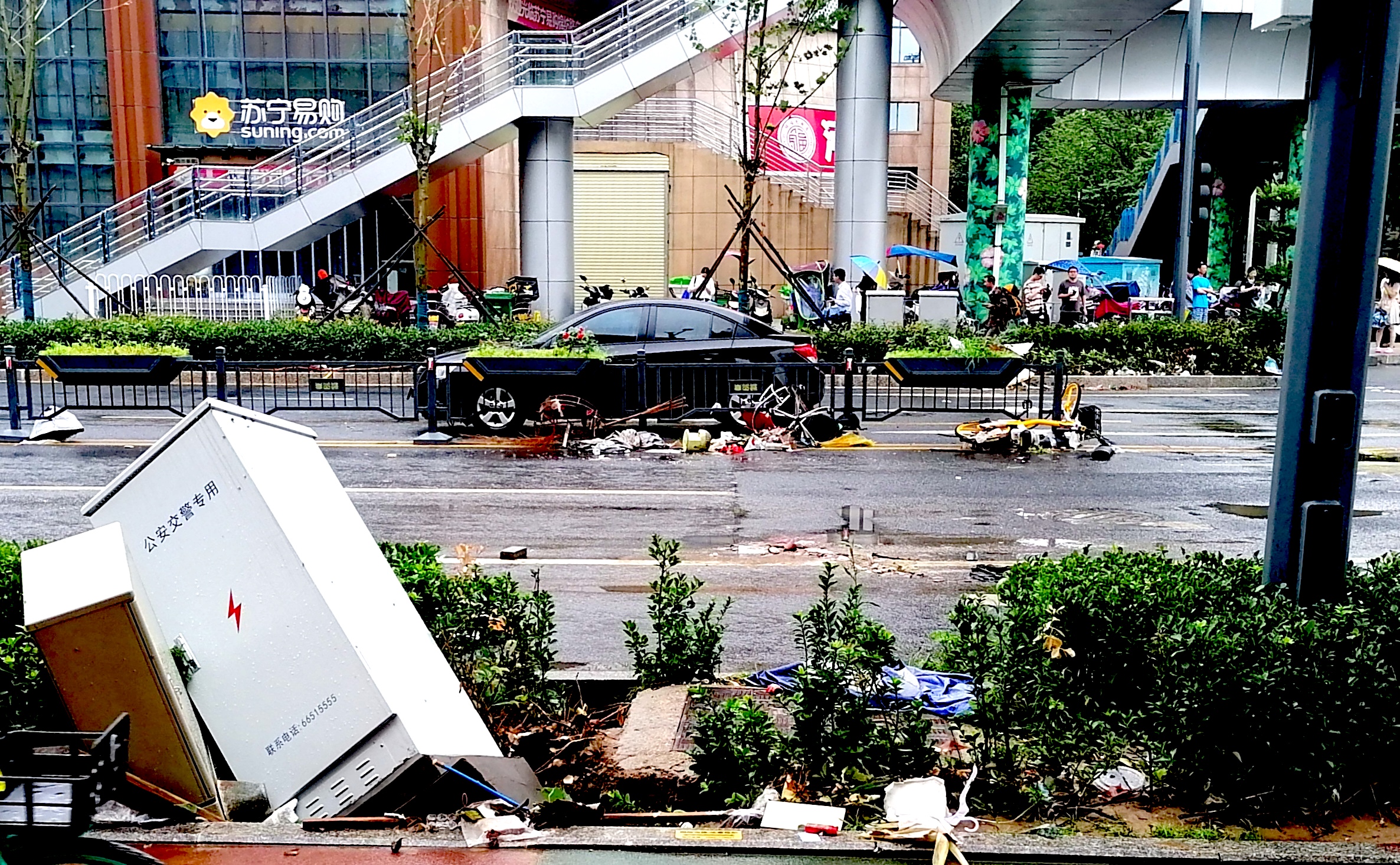
Damaged road in Zhengzhou, China, after deadly floods in July. (Wzl19371, CC BY-SA 4.0, Wikimedia Commons)
To grasp the severity of the climate crisis China will face, look no further than the recent flooding of Zhengzhou, a city of 6.7 million people and the capital of Henan Province. Over a 72-hour period between July 20 and July 22, Zhengzhou was deluged with what, once upon a time, would have been a normal year’s supply of rainfall.
The result — and think of it as watching China’s future in action — was flooding on an unprecedented scale and, under the weight of that water, the collapse of local infrastructure. At least 100 people died in Zhengzhou itself — including 14 who were trapped in a subway tunnel that flooded to the ceiling — and another 200 in surrounding towns and cities.
Along with widespread damage to bridges, roads and tunnels, the flooding inundated an estimated 2.6 million acres of farmland and damaged important food crops.
In response, President Xi Jinping called for a government-wide mobilization to assist the flooding victims and protect vital infrastructure. “Xi called for officials and Party members at all levels to assume responsibilities and go to the frontline to guide flood control work,” according to CGTN, a government-owned TV network. “The Chinese People’s Liberation Army and armed police force troops should actively coordinate local rescue and relief work,” Xi told senior officials.

Mourning for the victims in the July flood at Shakoulu Station, Line 5, Zhengzhou, China. (Windmemories, CC BY-SA 4.0, Wikimedia Commons)
The PLA responded with alacrity. As early as July 21, reported the government-owned China Daily, more than 3,000 officers, soldiers and militiamen from the PLA’s Central Theater Command had been deployed in and around Zhengzhou to aid in disaster relief.
Among those so dispatched was a parachute brigade from the PLA Air Force assigned to reinforce two hazardous dam breaches along the Jialu River in the Kaifeng area. According to China Daily, the brigade built a one-mile-long, three-foot-high wall of sandbags to bolster the dam.
These units were soon supplemented by others, and eventually some 46,000 soldiers from the PLA and the People’s Armed Police were deployed in Henan to assist in relief efforts, along with 61,000 militia members.
Significantly, those included at least several hundred personnel from the PLA Rocket Forces, the military branch responsible for maintaining and firing China’s nuclear-armed intercontinental ballistic missiles, or ICBMs.
The Zhengzhou disaster was significant in many respects. To begin with, it demonstrated global warming’s capacity to inflict severe damage on a modern city virtually overnight and without advance warning.
Like the devastating torrential rainfall that saturated rivers in Germany, Belgium, and the Netherlands two weeks earlier, the downpour in Henan was caused in part by a warming atmosphere’s increased capacity to absorb moisture and linger in one place, discharging all that stored water in a mammoth cascade.
Such events are now seen as a distinctive outcome of climate change, but their timing and location can rarely be predicted. As a result, while Chinese meteorological officials warned of a heavy rainfall event in Henan, nobody imagined its intensity and no precautions were taken to avoid its extreme consequences.
Ominously, that event also exposed significant flaws in the design and construction of China’s many “new cities,” which sprouted in recent years as the Chinese Communist Party (CCP) has worked to relocate impoverished rural workers to modern, highly industrialized metropolises.
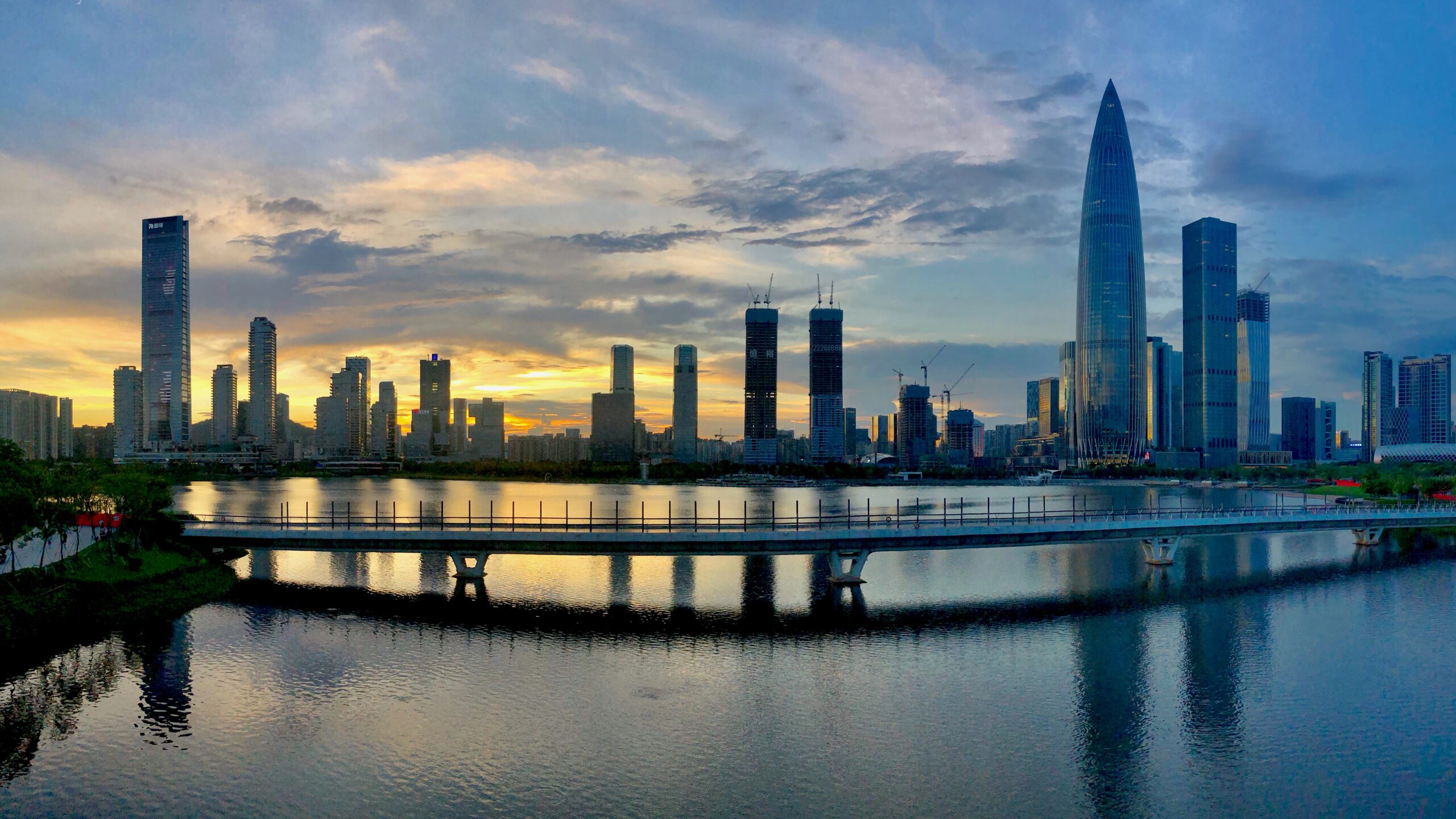
Shenzhen, China, skyline, 2020. (Charlie Fong, CC BY-SA 4.0, Wikimedia Commons)
Typically, these urban centers — the country now has 91 cities with more than a million people each — prove to be vast conglomerations of highways, factories, malls, office towers and high-rise apartment buildings. During their construction, much of the original countryside gets covered in asphalt and concrete.
Accordingly, when heavy downfalls occur, there are few streams or brooks left for the resulting runoff to drain into and, as a result, any nearby tunnels, subways, or low-built highways are often flooded, threatening human life in a devastating fashion.
The Henan flooding also exposed another climate-related threat to China’s future security: the vulnerability of many of the country’s dams and reservoirs to heavy rainfall and overflowing rivers.
Low-lying areas of eastern China, where most of its population is concentrated, have always suffered from flooding and, historically, one dynasty after another — the most recent being the CCP — has had to build dams and embankments to control river systems. Many of these have not been properly maintained and were never designed for the sort of extreme events now being experienced.
During the Henan flooding in July, for example, the 61-year-old Changzhuang Reservoir near Zhengzhou filled to dangerous levels and nearly collapsed, which would have inflicted a second catastrophe upon that city. In fact, other dams in the surrounding area did collapse, resulting in widespread crop damage. At least some of the PLA forces rushed to Henan were put to work building sandbag walls to repair dam breaches on the Jialu River.
China’s Perilous Climate Future
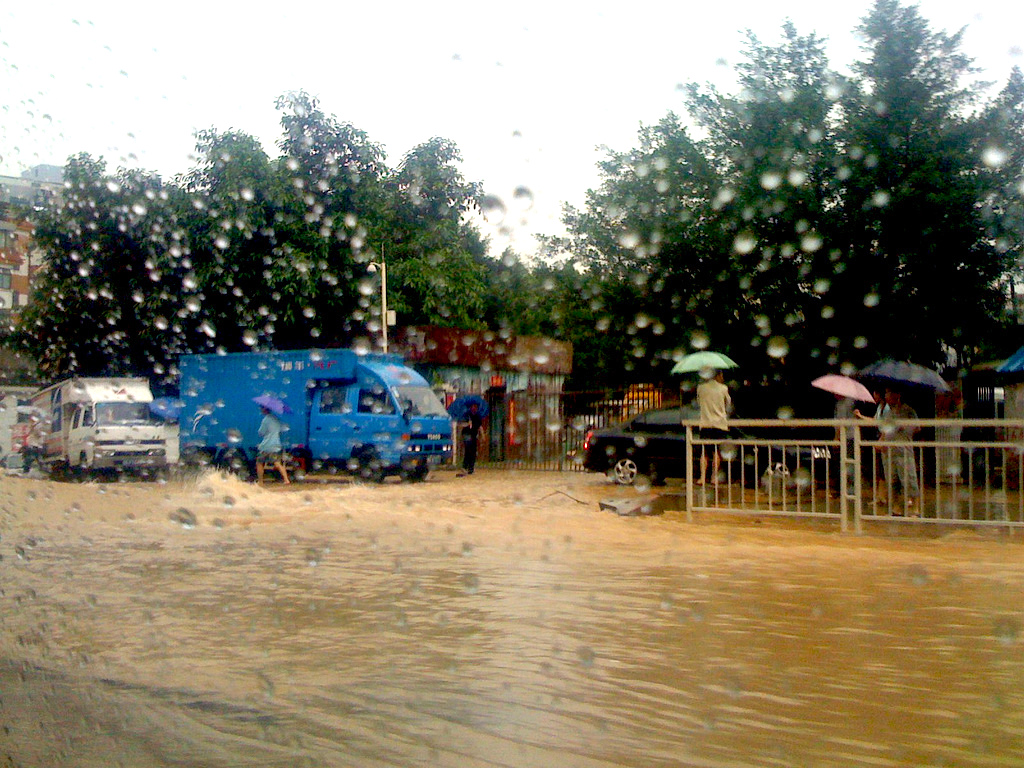
June 13, 2008: A flooded road in Shenzhen, China. (Chase Chesser, CC BY 2.0, Wikimedia Commons)
The Zhengzhou flooding was but a single incident, consuming the Chinese leadership’s attention for a relatively brief moment. But it was also an unmistakable harbinger of what China — now, the world’s greatest emitter of greenhouse gases — is going to endure with ever-increasing frequency as global temperatures rise.
It will prove particularly vulnerable to the severe impacts of climate change. That, in turn, means the central government will have to devote state resources on an as-yet-unimaginable scale, again and again, to emergency actions like those witnessed in Zhengzhou — until they become seamless events with no time off for good behavior.
In the decades to come, every nation will, of course, be ravaged by the extreme effects of global warming. But because of its geography and topography, China is at particular risk.
Many of its largest cities and most productive industrial zones, including, for example, Guangzhou, Shanghai, Shenzhen, and Tianjin, are located in low-lying coastal areas along the Pacific Ocean and so will be exposed to increasingly severe typhoons, coastal flooding, and sea-level rise.
According to a 2013 World Bank report, of any city on the planet, Guangzhou, in the Pearl River Delta near Hong Kong, faces the highest risk of damage, financially speaking, from sea-level rise and associated flooding; its neighbor Shenzhen was described as facing the 10th highest risk.
Other parts of China face equally daunting threats from climate change. The country’s densely populated central regions, including major cities like Wuhan and Zhengzhou as well as its vital farming areas, are crisscrossed by a massive web of rivers and canals that often flood following heavy rainfall.
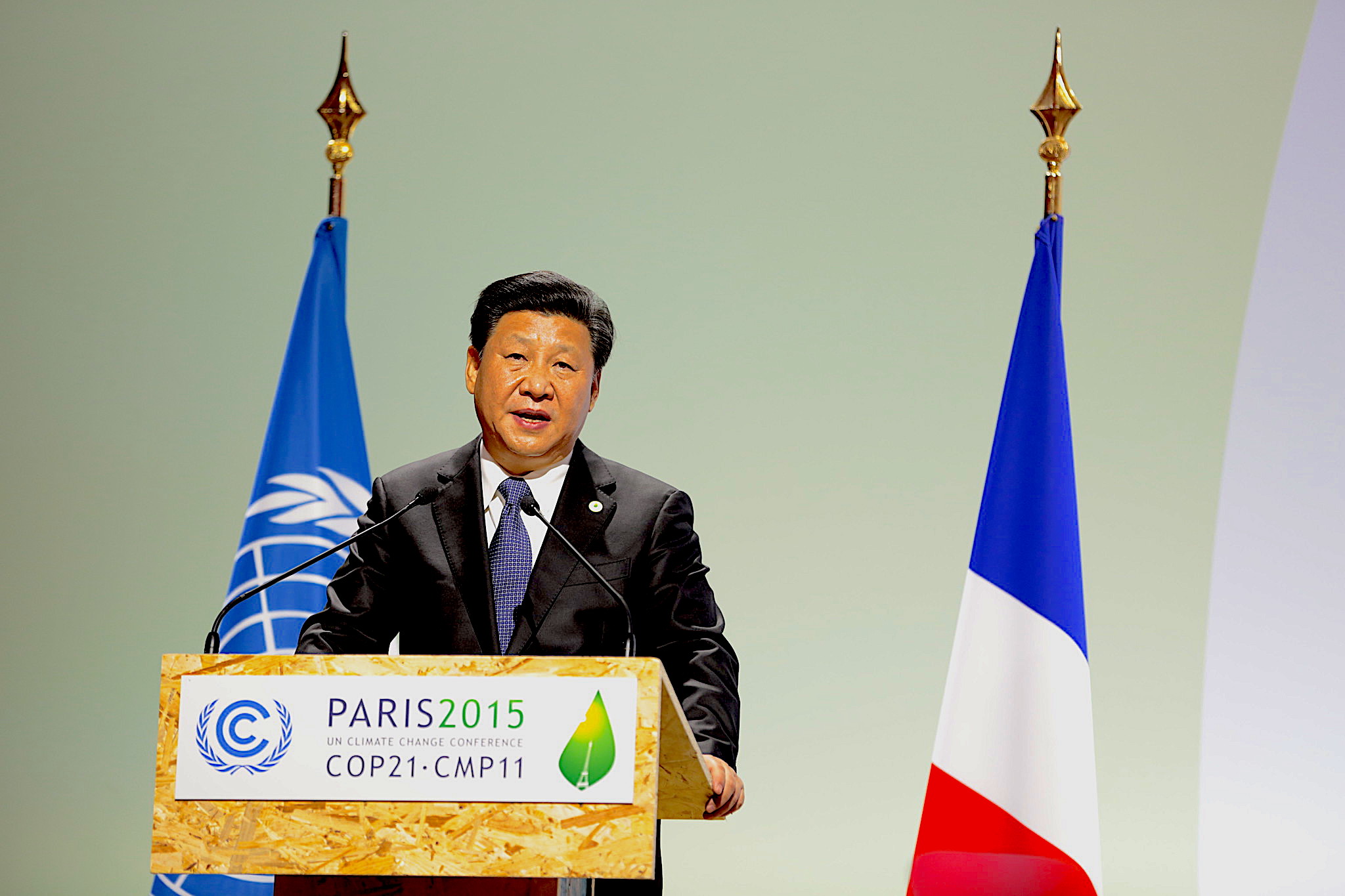
China’s President Xi Jinping at the 2015 climate change conference in Paris. (UNclimatechange, Flickr)
Much of China’s west and northwest is covered by desert, and a combination of deforestation and declining rainfall there has resulted in the further spread of such desertification. Similarly, a study in 2018 suggested that the heavily populated North China Plain could become the deadliest place on Earth for devastating heat waves by century’s end and could, by then, prove uninhabitable; we’re talking, that is, about almost unimaginable future disasters.
China’s distinct climate risks were brought to the fore in the IPCC’s new report, “Climate Change 2021.” Among its most worrisome findings:
– Sea-level rise along China’s coasts is occurring at a faster rate than the global average, with resulting coastal area loss and shoreline retreat.
– The number of ever-more-powerful and destructive typhoons striking China is destined to increase.
– Heavy precipitation events and associated flooding will become more frequent and widespread.
– Prolonged droughts will become more frequent, especially in northern and western China.
– Extreme heatwaves will occur more frequently, and persist for longer periods.
Such onrushing realities will result in massive urban flooding, widespread coastal inundation, dam and infrastructure collapses, ever more severe wildfires, disastrous crop failures, and the increasing possibility of widespread famine. All of this, in turn, could lead to civic unrest, economic dislocation, the uncontrolled movements of populations, and even inter-regional strife (especially if water and other vital resources from one area of the country are diverted to others for political reasons).
All this, in turn, will test the responsiveness and durability of the central government in Beijing.
Facing Global Warming’s Mounting Fury
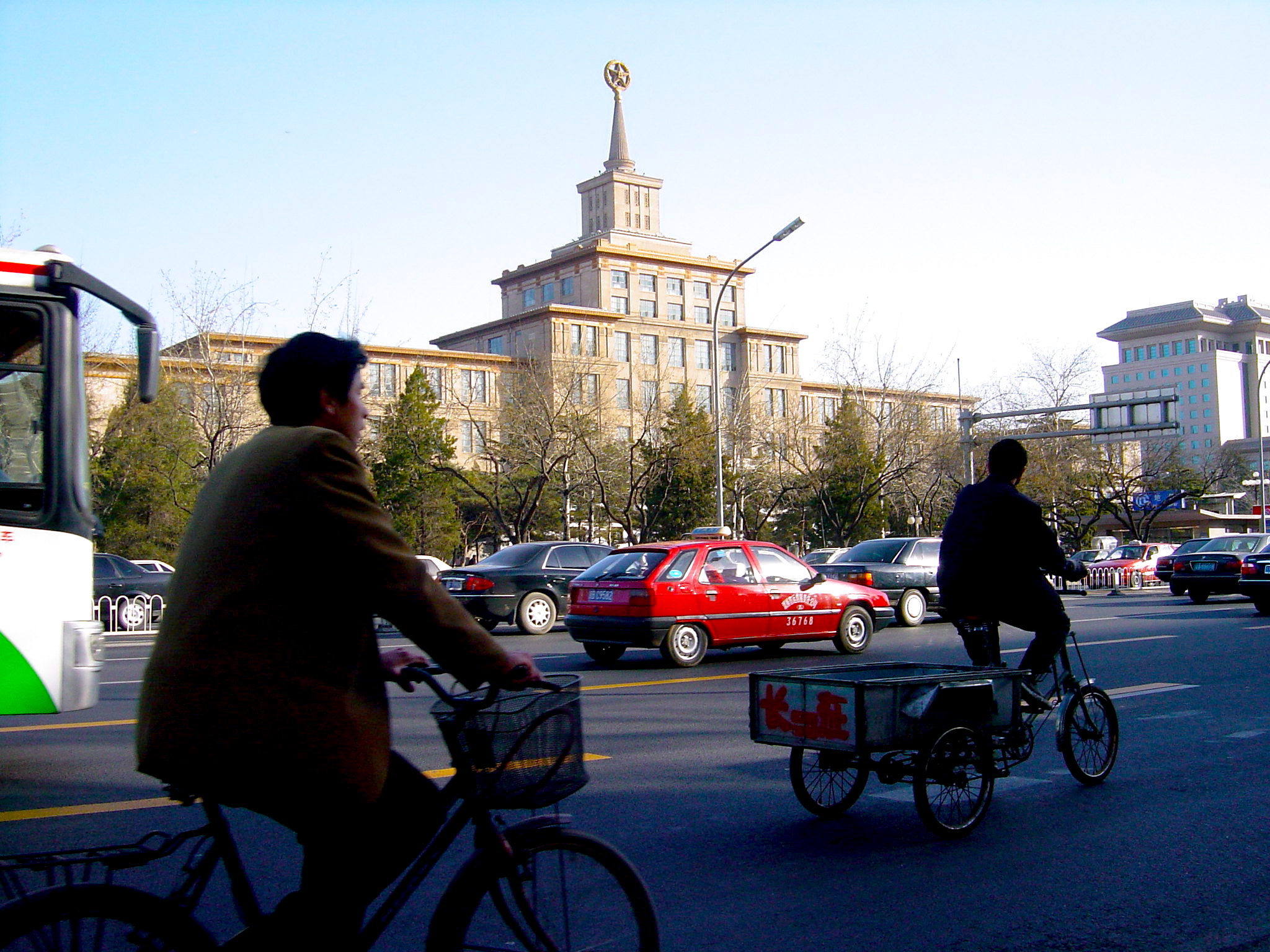
Traffic outside the Military Museum in Beijing in 2004. (Marc van der Chijs, CC BY-ND 2.0)
We Americans tend to assume that Chinese leaders spend all their time thinking about how to catch up with and overtake the United States as the world’s No. 1 superpower. In reality, the single greatest priority of the Communist Party is simply to remain in power — and for the past quarter-century that has meant maintaining sufficient economic growth each year to ensure the loyalty (or at least acquiescence) of a preponderance of the population.
Anything that might threaten growth or endanger the well-being of the urban middle-class — think: climate-related disasters — is viewed as a vital threat to the survival of the CCP.
This was evident in Zhengzhou. In the immediate aftermath of the flooding, some foreign journalists reported, residents began criticizing local government officials for failing to provide adequate warning of the impending disaster and for not taking the necessary precautionary measures.
The CCP censorship machine quickly silenced such voices, while pro-government media agents castigated foreign journalists for broadcasting such complaints. Similarly, government-owned news agencies lauded President Xi for taking personal command of the relief effort and for ordering an “all-of-government” response, including the deployment of those PLA forces.
That Xi felt the need to step in, however, sends a message. With urban disasters guaranteed to become more frequent, inflicting harm on media-savvy middle-class residents, the country’s leadership believes it must demonstrate vigor and resourcefulness, lest its aura of competency — and so its mandate to govern — disappear. In other words, every time China experiences such a catastrophe, the central government will be ready to assume leadership of the relief effort and to dispatch the PLA to oversee it.
No doubt senior PLA officials are fully aware of the climate threats to China’s security and the ever-increasing role they’ll be forced to play in dealing with them. However, the most recent edition of China’s “white paper” on defense, released in 2019, didn’t even mention climate change as a threat to the nation’s security. Nor, for that matter, did its closest U.S. equivalent, the Pentagon’s 2018 National Defense Strategy, despite the fact that senior commanders here were well aware of, even riveted by, such growing perils.
Having been directed to provide emergency relief operations in response to a series of increasingly severe hurricanes in recent years, American military commanders have become intimately familiar with global warming’s potentially devastating impact on the United States. The still-ongoing mammoth wildfires in the American West have only further reinforced this understanding.
Like their counterparts in China, they recognize that the armed forces will be obliged to play an ever-increasing role in defending the country not from enemy missiles or other forces but from global warming’s mounting fury.
At this moment, the Department of Defense is preparing a new edition of its National Defense Strategy and this time climate change will finally be officially identified as a major threat to American security. In an executive order signed on Jan. 27, his first full day in office, President Joe Biden directed the secretary of defense to “consider the risks of climate change” in that new edition.
There can be no doubt that the Chinese military leadership will translate that new National Defense Strategy as soon as it’s released, probably later this year. After all, a lot of it will be focused on the sort of U.S. military moves to counter China’s rise in Asia that have been emphasized by both the Trump and Biden administrations. But it will be interesting to see what they make of the language on climate change and if similar language begins to appear in Chinese military documents.
Here’s my dream: that American and Chinese military leaders — committed, after all, to “defend” the two leading producers of greenhouses gases — will jointly acknowledge the overriding climate threat to national and international security and announce common efforts to mitigate it through advances in energy, transportation, and materials technology.
One way or another, however, we can be reasonably certain of one thing: as the term makes all too clear, the old Cold War format for military policy no longer holds, not on such an overheating planet. As a result, expect Chinese soldiers to be spending far more time filling sandbags to defend their country’s coastline from rising seas in 2049 than manning weaponry to fight American soldiers.
Michael T. Klare, a TomDispatch regular, is the five-college professor emeritus of peace and world security studies at Hampshire College and a senior visiting fellow at the Arms Control Association. He is the author of 15 books, the latest of which is All Hell Breaking Loose: The Pentagon’s Perspective on Climate Change (Metropolitan Books).
This article is from TomDispatch.com.
The views expressed are solely those of the author and may or may not reflect those of Consortium News.

With all due respect, this article is quite wrongheaded. Just two points to ponder:
One, China has millennia of experience dealing with catastrophes of the type likely to be exacerbated in a CC world. Flooding, fires, earthquakes, hurricanes, pandemics, China has faced them all, many many times, and generally thrived.
Two, as demonstrated readily by the COVID year, China’s governance model is FAR superior to ours in terms of mobilizing resources to fight disasters when push comes to shove. Compare the impact of the pandemic on China and Vietnam versus US and UK. Night and day, no?
So, counter to this article, CC will simply be one more reason why China will leave us far behind economically as well as militarily over the next decades.
That is if the world sees 2049. The pattern of history suggests the US and China are moving inexorably towards conflict. To maintain its global hegemony – and there is no reason to think it will not try – the US will have to face China in battle. As history warns: every empire eventually gets the war it is trying to avoid. Like during the Cold War, we still need to avoid World War Three today.
Please, please, please we are all in this together.
The WHOLE Planet no matter were you live will feel
the Earth regurgitate the toxin that is Climate Change.
This article doesn’t mention his own country’s contribution to the man-made aspects of global warming which is presipitating the extinction of human life on this planet. Some sections in American politics don’t even accept Global Warming. The fact is that America has contributed per capita more to this distruction than any other country, including China. But the greatest crime of all was for J.P.Morgan to withdraw funding to the great Engineer Nikola Tesla’s research into harnessing the free energy in space and in the world’s electromagnetic energy some 112 years ago in order to save his and other’s investments in the fosil fuel and electrical distribution industries – the main cause of our plane’s destruction. Even now, where the writing is clearly on the wall, efforts are still being made ridicule, seize patent applications and to kill engineers brave enough to try to market their developments of Tesla’s thinking.
I don’t agree with Michael on several points, although global warming chaos isn’t one of them.
China isn’t interested in becoming a military superpower and generally acts in self defense of western aggression.
It’s leadership is well aware of climate vulnerabilities and is taking actions concerning that very threat. It might not succeed, but these guys are trying, as opposed to what western oligarchs are doing, which is basically nothing outside of planning trips to Mars.
In case Mike hasn’t been to China and lived there for a long period of time, let me assure him that, the Chinese don’t have or think in terms of five year plans to begin with, but rather, they think in terms of hundred year plans, which is something so foreign to the western mind that they can’t comprehend the concept.
Lastly, the U.S. is in an even worse position from the perspective of climate change but somehow these Nation Magazine folks can’t bring themselves to write much past the DNC party line. I wonder how that works out for them at the end of the day?
Your response to Mr. Klare’s article is incredibly close to my own and I would have stated so, but you have made the points I would have made myself.
Thanks! I’ve wondered how the New Cold War and Global Warming would interact!
I suspect many US leaders are counting on the Rapture or the Space Brothers to solve the problem, while they continue to goof around.
Numeracy is not a public virtue. Take for example the 2049 figure. Where did it come from and how was it arrived at? Well, in this article, the 2049 figure came from the top brass in Washington, General Lloyd Austin; which suggest that it was arrived through careful analysis. If Afghanistan is any indication, that figure is not very reassuring. Yet there is it is, the 2o49 figure, taking a life of its own in the public media. As far as the public is concerned, it could’ve been 2149. Really who in the public has any concept of 2049? I doubt the public has any concept of 2022.
The author of this article fills that vacuum by telling us that China will be too busy defending off the Climate Catastrophe to be worried about Austin’s concern, a Chinese military superior to us. Wait. Do we really have to wait till 2049 for that? Didn’t the world’s most expensive (and corrupt) military just fail on a massive scale in 2021 in Afghanistan? No. No. The US is still the gold standard (at least as military stuff are concerned.) Yeah. Right. If you buy that, I have a bridge I’d like to sell y0u.
The author does not dispute the general’s presumption regarding US military supremacy; instead the author argues China will be underwater.
The closely related figure of 2050, a year before Chinese military becomes world class, is when Climate Catastrophe is scheduled to hit certain milestones, which ones depends on who you ask. By some accounts, by 2050 the planet will be 1.5 Celsius warmer than pre-industrial times. Maybe by 2049 we won’t be quite there yet? Is that why the clairvoyant General Austin picked that figure instead? Before Climate Catastrophe gets here, China will be too strong to contain? Is that it? NAH, says the author of this article, China will be underwater by then.
Wake up. Do you have any idea what 1.5 Celsius will look like? Stop and think about it. You have enough data to do your own thinking. We are now at 1.2 Celsius? . . . and how do you think we are doing? Fine? Do you remember when we were at 1.1 Celsius? . . . not really. Maybe that’s because there wasn’t much to remember it from. Nothing at 1.1 Celsius really stood out; but at 1.2 Celsius, you can view for yourself what that means. The difference between 1.1 and 1.2 has been overwhelming. Do you not see that? You live through that. Imagine then what 1.3 will bring. Do you think you will survive 1.3 let alone 1.4, 1.5. and 1.6 which are slated to occur no matter what we do?
I find it incredible no one is talking about 1.3, scheduled to arrive within the next 6 years if not sooner, No one wants to talk about 1.3; but we can be sure it will be worse than 1.2, a lot worse. Perhaps 1.3 is not survivable. Yet it is a lot more eminent than the warnings in this article.
By 2049 the Climate Catastrophe won’t be limited to China.
“…The United States, he assured the Senate Armed Services Committee, continues to possess “the best joint fighting force on Earth.” But only by spending countless additional billions of dollars annually, he added, can this country hope to “outpace” China’s projected advances in the decades to come….”
This is probably the most important piece of information in this article precisely because the whole narrative misses the obvious point – that the US needs to spend billions more dollars in making the US army vastly larger than that of China to keep apace with their control of the planet. Simply put. the US intends to inflict more emission levels than they already do which in fact match those of China, all so they can be top dog in the power game they play every year. It is the US which is the greatest threat to climate change, to single out China is to deny Washington’s global activities and their massive contribution in the rise in climate threats.
And if you want to worry about the US, worry about what will happen when the stupid country loses the dollar as the world’s reserve currency. Right now, government is printing money and giving it to people who consume junk from China. That consumption is counted into the GDP, making us look prosperous, when actually it’s a measure of Chinese prosperity. This means that China is sucking the wealth out of the US, and we are too stupid to see it.
It is obvious to many of us that climate change is urgent, but the terrible thing is that the USA, instead of helping and cooperating with other countries, especially China, spends all its energy (!) on threats, wars, sanctions and trying to stop China’s rise which includes “green solutions” and more equality among populations.
“We Americans tend to assume that Chinese leaders spend all their time thinking about how to catch up with and overtake the United States as the world’s No. 1 superpower.” Exactly. China claims it is NOT doing this,and its plans are long-term and cooperative. It military buildup (like that of Russia) is in response to the belligerence of the USA.
Excellent article. In fact, I am looking out of the window of my study and noted that we are at the highest point of our neighborhood. I wonder what will happen to the houses on the downslope.
They will be spewing flame into yours.
Excellent
Que fera l’armée de la BÊTE washingtonienne lorsque la destruction des changements climatiques s’abattra encore plus dévastatrice et plus nombreuse en Amérique du Nord? Que fera-t-elle devant la population Nord Américaine en furie contre leurs dirigeants?
Aw shucks.
Wouldn’t it be wunnerful if the Chinese military were to become the equal of the U$ military in terms of destructive environmental impact?
Consider that, should your assessment of the future prove correct (as I suspect it shall), the U$ military may itself no longer be free to roam about visiting hell and havoc on others, unless exceptionalism and indispensability remain uncurbed?
However strange my perspective might be, if I am honest, I am far less concerned with a Chinese military of the future, than I am with the U$ military of the present and its “mission” of Full Spectrum Dominance.
Naturally, I realize that stating such a thing is decidedly is simply not cricket.
As all the hoary myths told about OUR men (and women) with guns hold that not only is the Almighty on our side, but that OUR presidents always consult with the Sky Daddy before unleashing the digs of war, but only for humanitarian reasons of course.
Just suppose the Chinese were not convinced BY U$ behavior and bombastic rhetoric that they’ve little choice but to build up their capacity to destroy, simply to protect themselves?
What if WE were to seek cooperation with the Chinese (and the Russians) to join together to actually deal with the harm already done to the environment, of which “climate change” is but a part?
Naturally that, in the parlance of U$ power, is already “off the table”.
Were the U$ NOT committed to maintaining a pathological hegemony, might not other nations (excepting Israel, of course – who regard themselves as even more God-chosen, than we proclaim) be less likely to arm themselves to the teeth in anticipation of the “whites of their eyes” confrontation?
If environmental calamity will becalm the military storms of the Chinese, then might we not hope (absurdity that it is) that U$ aggressions might similarly be diverted into civil issues of dealing with our own increasing environmental precarity?
And would not wisdom, even now, at this early (or late) date suggest that it would be far wiser to invest, NOW, in reason and common humanity?
Let us bring the burden of conscience and humanity home, finally, rather than continuing to be the primary and major threat to continued human existence which we now “represent”.
THAT seems, to me, to be at least as important as pointing out that, if we do not collectively and cooperatively join with the Chinese in dealing with our common plight, that THEY will be preoccupied with calamitous environmental issues, as if we will be able, in any fashion, to take some advantage, seemingly, of what THEY will be dealing with in future.
Unless everyone, here, clearly understands that the Chinese will not be alone, dealing with environmental collapse, then what may be left to assume except that insanity will continue to rule U$ behavior.
I do not expect that yo work out well.
A dose of sanity can but demand that WE dare take the first step to encourage, by our behavior, a very different future.
If we cannot or will not do that, then how may WE pretend, for even an instant, that it is OUR behavior, historically, and in the present moment which is impelling a catastrophe, nuclear war, which is the matching endpoint of existence that equals global environmental collapse.
Should either occur, we are the primary driving force.
I do not see how that reality may be denied, obscured, side-stepped by any rhetorical deceit.
Whatever insane nonsense might be advanced to excuse this truth, however clever it might be, is simply a damned lie.
Now, I admit my prejudice quite openly, I should like to see humanity exist for ten, twenty, or a hundred thousand more years.
Unless an asteroid or other “heavenly” body strikes us, such future as we may have and enjoy is, very much up to us, all of us, even those of us crazed by idiocy and domination, by greed and corruption.
And, dear brothers and sisters, that choice should made by all of us.
Not by pooh-bas or billionaires or military bigwigs.
Perhaps all militaries ought be seen as anti-life and destructive juggernauts of delusion.
And, rather than thanking the soldiers of mayhem for their “service”, we might better ask them what the fuck they think they are doing.
Because, sure as hell, they ain’t doing it get ma, pa, or the little ones at home.
Wars are about profit, not principle.
And those who would make the world an armed camp of hostility are not sagacious wisdoms but small-minded pathologies mistakenly assumed to be actual human beings.
There is nothing noble in turning the world into a slaughterhouse.
And the U$ could, were it so motivated, dare take the first step toward disarming hostility and hatred.
Of course, that might be too big a step for the U$, but it would be a great “move” for humanity.